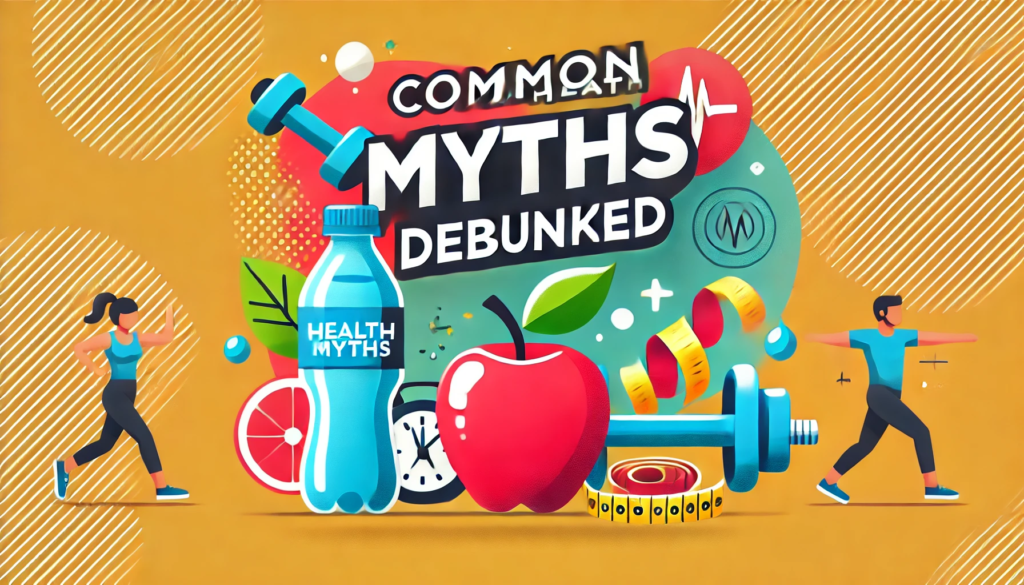Common Health Myths Debunked
Health myths have been around for centuries, and they continue to influence our choices today. From the food we eat to the way we exercise, common health myths can often mislead us, causing confusion and sometimes even harm. In this blog, we’ll address and debunk some of the most widespread health myths, offering you evidence-based insights to make informed decisions about your well-being.
Myth 1: Drinking 8 Glasses of Water a Day is Essential for Everyone
One of the most popular health myths revolves around the idea that you need to drink at least eight 8-ounce glasses of water per day. While staying hydrated is crucial for maintaining bodily functions, the amount of water you need depends on various factors like age, weight, activity level, and climate.
In reality, the National Academies of Sciences, Engineering, and Medicine suggests that men should aim for about 3.7 liters (125 ounces) of water a day, and women should aim for 2.7 liters (91 ounces). This includes water from all beverages and food.
Myth 2: Carbs Are the Enemy of Weight Loss
Carbohydrates have been demonized in recent years, with many diets claiming that cutting carbs is the key to shedding pounds. However, not all carbs are created equal. Refined carbohydrates, such as white bread and sugary snacks, can contribute to weight gain and other health issues. On the other hand, complex carbohydrates like whole grains, legumes, and vegetables provide essential nutrients and fiber, which are beneficial for your overall health.
Research has shown that when consumed as part of a balanced diet, carbohydrates can support weight loss by keeping you full for longer and providing energy for your daily activities.
Myth 3: You Should Always Avoid Fats to Stay Healthy
Another health myth that has circulated for years is that all fats are bad for you. While it’s true that trans fats and saturated fats should be limited, healthy fats are essential for various bodily functions, including hormone production, brain function, and the absorption of certain vitamins. Healthy fats are found in foods like avocados, nuts, seeds, and oily fish such as salmon.
In fact, consuming the right kinds of fats can help you maintain a healthy weight and reduce the risk of heart disease. The key is moderation and choosing unsaturated fats over saturated and trans fats.
Myth 4: You Need to Detox Your Body Regularly
The idea of “detoxing” has become increasingly popular, with many people opting for detox diets, teas, and juices to cleanse their bodies of toxins. However, your body already has a sophisticated detoxification system in place, with organs like the liver, kidneys, and digestive system working tirelessly to remove waste and toxins naturally.
There is no scientific evidence to support the claim that detox diets or products can significantly enhance the body’s natural detoxification process. In fact, many of these products can be harmful, as they may cause dehydration, nutrient imbalances, or digestive issues.
Myth 5: Eating Late at Night Leads to Weight Gain
The belief that eating late at night leads to weight gain is another common health myth. The truth is that it’s not the time of day you eat that matters, but the total number of calories consumed. Your body doesn’t “know” the time of day and will store excess calories as fat if they aren’t used for energy.
In fact, research suggests that eating smaller, balanced meals throughout the day, including a light evening snack, can help regulate metabolism and prevent overeating later in the night. The key is to focus on the quality and quantity of the food you’re eating, rather than the timing.
Myth 6: All Sugars Are the Same
Not all sugars are created equal, and understanding the difference is crucial for making healthier dietary choices. While both refined sugars and natural sugars found in fruits and vegetables provide calories, the difference lies in how they affect your body.
Refined sugars, such as those found in processed snacks and sugary drinks, can spike blood sugar levels and contribute to weight gain, inflammation, and chronic conditions like diabetes. On the other hand, natural sugars in whole fruits come with fiber, vitamins, and antioxidants, which help slow down the absorption of sugar and provide numerous health benefits.
Myth 7: You Need to Sweat to Have a Good Workout
Many people believe that in order to have an effective workout, they need to break a sweat. While sweating is a sign that your body is working hard to cool itself down, it doesn’t necessarily mean that you’re burning more calories or getting a better workout.
The effectiveness of your workout depends on factors like intensity, duration, and the type of exercise you’re doing. A moderate workout like walking or yoga can still be beneficial for your health, even if you don’t sweat as much as you would in a high-intensity session.
Myth 8: Supplements Can Replace a Healthy Diet
Many people turn to dietary supplements to fill in the gaps in their nutrition. While supplements can be helpful in certain situations (for example, for people with specific nutrient deficiencies), they are not a replacement for a healthy, balanced diet.
Whole foods like fruits, vegetables, lean proteins, and whole grains provide a wide range of essential nutrients, including fiber, antioxidants, and phytochemicals, that supplements simply cannot replicate. Relying on supplements instead of whole foods may lead to nutrient imbalances and other health issues.

Debunking Common Myths: The Data
To further clarify some of the points above, here is a table showing the differences in nutritional value between refined and natural sugars:
| Type of Sugar | Source | Nutritional Benefits | Health Risks |
|---|---|---|---|
| Refined Sugar | Processed foods, soft drinks | High in empty calories, no nutrients | Weight gain, diabetes, heart disease |
| Natural Sugar | Fruits, vegetables | Provides vitamins, fiber, and antioxidants | None when consumed in moderation |
FAQ Section
Q1: Can I lose weight by drinking only water?
A1: While staying hydrated is important for weight loss, drinking only water is not a sustainable solution. Healthy weight loss involves a balanced diet, exercise, and overall lifestyle changes.
Q2: Are carbs really bad for my health?
A2: No, not all carbs are bad. Whole grains, vegetables, and legumes are healthy sources of carbohydrates that provide essential nutrients. It’s important to limit refined carbs, like white bread and sugary snacks.
Q3: Is it true that eating at night leads to weight gain?
A3: Not necessarily. What matters more is your overall calorie intake and the types of food you consume. Eating a balanced meal or snack in the evening is fine as long as it fits into your daily caloric needs.
Q4: Do detox diets really work?
A4: No, detox diets are not necessary. Your body already has natural detox systems, and detox diets often cause more harm than good by leading to nutrient imbalances or dehydration.
Q5: How much water should I drink every day?
A5: The amount of water you need depends on your body, activity level, and climate. Generally, men should aim for 3.7 liters (125 ounces) and women should aim for 2.7 liters (91 ounces) per day, including all beverages and food.
By addressing these common health myths, you can make better, more informed choices about your lifestyle. To learn more about maintaining a healthy lifestyle, visit Healthy Vibe Hub for more tips and resources on improving your well-being.
By debunking these health myths, we can focus on evidence-based practices that help us live healthier lives. Be sure to share this blog with others who might still be misinformed!


